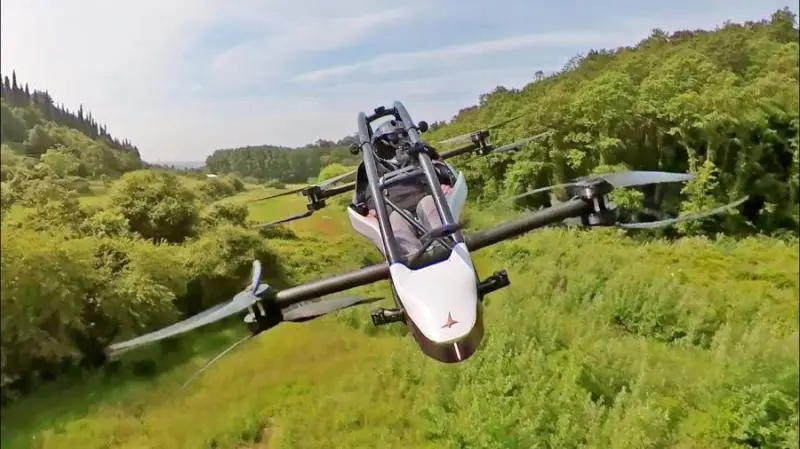Recent ParaZero Deal Signals New Manufacturing Potential for Safer Drone and Advanced Air Mobility Operation
By DRONELIFE Features Editor Jim Magill
A recent deal by Israel-based ParaZero Technologies could signal the potential for the company to establish new, large-scale manufacturing capability to produce aviation safety equipment for drones and safety for the growing Advanced Air Mobility (AAM) industry.
On September 25, ParaZero said it received a $187,000 purchase order from a U.S.-based AAM company. This order, which follows the customer’s successful completion of an advanced drone safety-system customization project, includes ParaZero’s preparations for serial production, as well as the delivery of an initial batch of safety systems.
This order also represents the final step in fulfilling the comprehensive project requirements for the client, and ensures the integration of ParaZero’s innovative drone safety technologies into the client’s AAM system, the company said in a press statement.
The agreement represents the latest step in ParaZero’s journey toward paving the way for the future growth of the AAM and unmanned aerial vehicle industries. In an interview, Amir Lavi, ParaZero’s head of marketing, told DroneLife that ParaZero’s development of safety innovations, such as parachute recovery system, has been instrumental in helping drone operators achieve their long-sought goals of gaining authorizations to fly over people or beyond the visual line of sight.
“I think if we’re looking into the future of urban air mobility and drones, it’s going to be huge,” Lavi said. “And ParaZero plans to be part of enabling this future.”
With major operations in North and South America, Europe and Australia, ParaZero has worked with a number of national civil aviation authorities to provide the safety systems that enable drone operators to secure the authorizations that allow commercial flights to take place.
“We’re now working with multiple [original equipment manufacturers], drone manufacturers worldwide. Some of the more famous of them are Speedbird in Brazil, or Draganfly in Canada,” he said. “Speedbird does BVLOS deliveries and Draganfly is doing heavy lifting.”
In addition to its work with drone manufacturers, the company also has worked to develop safety systems for manned AAM aircraft, including the Lift Hexa, built in Austin, Texas and the Jetson One, produced in Tuscany, Italy. Lavi said ParaZero is also partnering with another U.S.-based AAM company, although he wasn’t at liberty to name the company yet.
“Every region in the world is different in terms of regulation,” he said. ParaZero has sold more than 10,000 units in five different continents since the company was founded in 2013.
In the U.S., Lavi said ParaZero worked with DJI to help that company equip its Mavic 3 with the safety features needed to secure FAA approval of a waiver for flights over people.
Recently the FAA changed its regulations for drone operations over people, characterizing UAVs into three categories, according to their weight. The DJI Mavic 3, is characterized as a Category Two drone, is required to be equipped with an ASTM-certified parachute-recovery system as well as other safety features including remote ID, strobe lights and prop guards, in order for a certified pilot to apply for the waiver to operate over people.
The Mavic 3’s safety system recently received ASDM certification after undergoing a rigorous series of tests to ensure that it could safely survive a series of simulated failures without landing in a way that could potentially injure people or damage property. These tests included: full forward speed, hovering, manual triggering, autonomous triggering, killing only one motor and killing all the motors together.
The aircraft was required to survive 45 successful drop tests in a row, “meaning if you did 44 and you messed up the 45th, you had to start all over again,” Lavi said.
Similarly, ParaZero works with the drone manufacturers to ensure that their vehicles meet the safety specifications for the different jurisdictions that they operate in. For example, for Speedbird to conduct BVLOS deliveries in Brazil, the operator or the drone manufacturer must prove the integrity of their safety system overall as well as prove the integrity of their ParaZero parachute-recovery system.
In the U.S., before awarding a BVLOS waiver, the FAA requires the testing of both the integrity of the system and the integrity of the parachute.
ParaZero specializes in the custom integration of its safety technology into every size and configuration of drone, “basically every drone from one-kilo, or two pounds, to one-ton,” he said.
In addition to its work designing parachute-recovery systems and related safety systems for commercial drones, ParaZero recently announced its intention to enter the counter-drone and defense markets. Lavi said that to date the company has sealed deals with two defense contractors, but was unable to disclose details of those agreements.
While the company serves a wide range of international markets, Lavi said ParaZero has a particular focus on the huge U.S. market for drone and AAM services.
He said the company has been working to support the drone operations of first-responder agencies, such as the Chicago Police Department, as well as a number of media groups such as CNN, ABC and Fox News. ParaZero also provides safety technology to construction companies that employ drones for mapping and surveillance.
“Of course, one of the biggest segments is video, providing video creators with the ability to film large events over people, creating ads and videos that were never possible before,” he said. “That allows operators to secure more jobs and create even higher-paying jobs.”
Read more:
Miriam McNabb is the Editor-in-Chief of DRONELIFE and CEO of JobForDrones, a professional drone services marketplace, and a fascinated observer of the emerging drone industry and the regulatory environment for drones. Miriam has penned over 3,000 articles focused on the commercial drone space and is an international speaker and recognized figure in the industry. Miriam has a degree from the University of Chicago and over 20 years of experience in high tech sales and marketing for new technologies.For drone industry consulting or writing, Email Miriam.
TWITTER:@spaldingbarker
Subscribe to DroneLife here.

